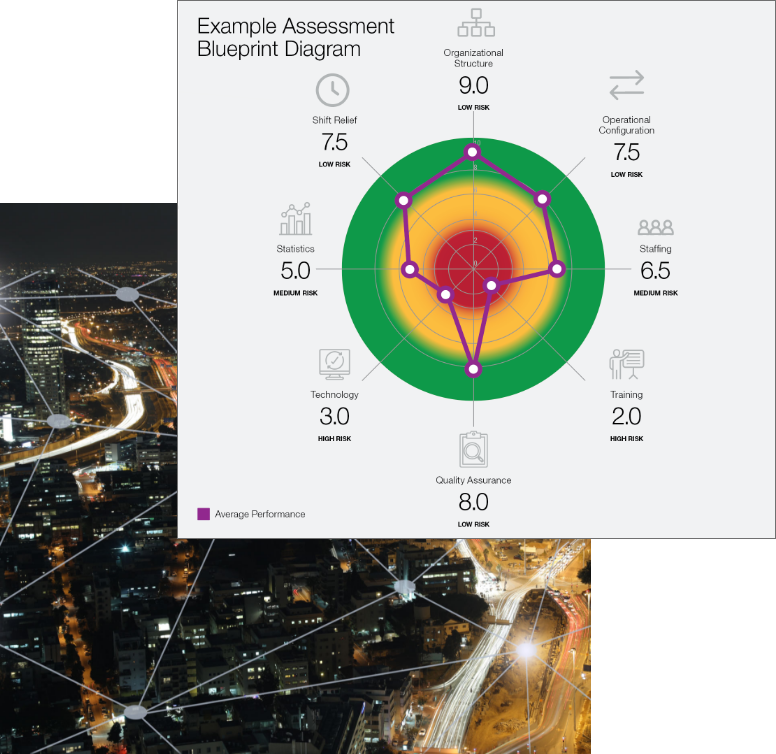2025 State of the Industry: Third Edition
State of Today’s Public Safety Organizations: 2025 Insights
The third edition report produced by Mission Critical Partners summarizes where hundreds of state and local public safety organizations stand regarding nine critical aspects of public-safety operations.
The 2025 State of the Industry report is based on hundreds of assessments we’ve completed of the public-safety environment. These insights can prepare public safety leaders to make changes that will improve their organization and the industry.
See how the industry fared and where the most significant areas of weakness are in the 2025 State of the Industry report.

- MAPS® scoring for multiple industries in public-sector organizations
- Includes data from hundreds of assessments completed by MCP since 2022
- 33-page report exploring insights and analysis on trending topics

Methodology
MCP’s Model for Advancing Public Safety® (MAPS®) is a proprietary assessment methodology developed by MCP for determining where an organization stands regarding numerous critical factors. MAPS is based on:
- Industry standards developed by organizations such as the Federal Communications Commission’s Task Force on Optimal Public Safety Answering Point Architecture, the National Institute of Standards and Technology, the National Emergency Number Association, and the Association of Public-Safety Communications Officials-International
- Formalized accreditation programs
- Best practices
- MCP’s collective expertise
The third edition report includes data from assessments completed by MCP since August 2022.
VIDEO: Learn More About MAPS
Explore Key Findings
Chapter 1
Land Mobile Radio
Land mobile radio (LMR) systems continue to be the backbone for emergency-response communications, both in 911 centers and in the field.
Chapter 2
Geographic Information Systems
GIS requires staff, data, hardware, software, and systems for it to be successful in the operation of a Next Generation 911 (NG911) system.
Chapter 3
Next Generation 911 Readiness
Next Generation 911 are still considered a quantum leap forward compared with legacy 911 systems. But while progress has been made in terms of their implementation, they remain very costly, complex, and time-consuming initiatives.
Chapter 4
Operations
As emergency communication centers grow more sophisticated, there is a push for 911 centers to operate independently, report directly to municipal or county administration, or operate under more neutral entities like emergency management agencies, rather than law enforcement and fire/rescue organization.
Chapter 5
Security
The physical security of public safety facilities, especially 911 centers, generally is solid. Yet, cyberattackers are increasingly targeting public sector organizations, and officials have increased their focus on cybersecurity.
Chapter 6
Staffing
Staffing continues to be one of the most vexing challenges within the public-safety sector, especially the 911 community. Yet, the situation seems to be improving somewhat, fueled by creative approaches to recruitment, hiring, compensation, and shift configurations.

Chapter 7
Data Integration
Public safety leaders should be focused on building a culture where the organization fully understands and supports the importance of data.
Chapter 8
Artificial Intelligence
Excitement regarding AI in the public-safety sector is exploding. However, understanding the technology and how it can be leveraged to improve emergency response outcomes remains at a nascent stage and agencies should perform plenty of due diligence before taking the leap.
Chapter 9
Organizational Change Management (NEW)
Change is necessary for public-sector organizations to thrive because conditions and environments continually evolve. Unfortunately, organizations and their people steadfastly try to avoid change for a variety of reasons.
